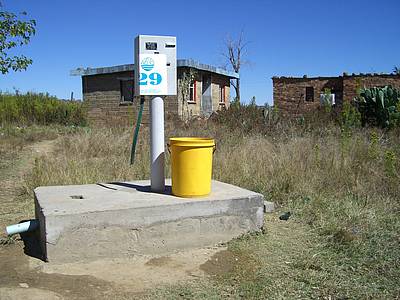The Mazibuko case against the City of Johannesburg’s installation of prepayment meters (with automatic cut-off valves) went all the way to the South African Constitutional Court in 2009. Although the claimants ultimately lost the case, there is no doubt that all players spent massive amounts of energy thinking about this technology and its impacts. As with most litigation the issue became highly polarized and emotionally charged.
Food and Water Watch produced a fact sheet entitled “11 Reasons to oppose Prepaid Water Meters” (2006). These can be summarized as follows:
– Poor areas are targeted for PPMs, magnifying inequality. Poor customers are treated differently.
– PPMs deny access to water to those who cannot pay and result in others cutting their water usage severely, undermining public health and exacerbating gender inequality when alternative sources are used.
– PPMs support a cost recovery approach which treats water as a commodity rather than a human right.
– PPMs do not allow for safeguards, people are “simply cut off” and there is no scope for procedural protection. They exacerbate emergencies.
Now PPMs are gaining attention again in the context of Malawi. Municipalities in many African countries, with support from foreign donors, have introduced PPM over the past five or so years, typically beginning with a pilot program. Their aim is cost effectiveness — they no longer have to read meters, print bills, and collect revenue, and can count on a high level of return. They claim that water is cheaper for people, who they say often prefer a reliable service and being able to control their water usage. The counter-argument is that:
“this is just lazy water management — instead of dealing with the real customer issues, they slap prepaid water meters on the customers that are harder to deal with. It doesn’t solve a thing in terms of providing water, but it probably looks better for everyone, because you can claim that you provided a connection.”
While PPMs have been introduced already in a variety of contexts in Lesotho (2004), Namibia (2004), Kenya (Kisumu pilot discontinued 2010, Nakuru 2011, Nairobi 2012), Uganda (2008), Zambia (2007), and Botswana, the Malawian case is important because local NGOs are demanding investigation of PPMs’ impacts. If such an investigation is sanctioned by officials and accepted by NGO and community stakeholders, in Malawi or more widely, it could produce important findings for ensuring the human right to water.
According to Nyasa Times (Malawi), Citizens for Justice, Institute for Policy Interaction, and other local NGOs have written to the World Bank, which is providing $500K toward a prepayment water scheme being piloted by the Northern Region Water Board (NRWB). They want implementation to be suspended while under review, and demand that the NRWB “significantly redesign or abandon the project” as no environmental or social assessments were done.
These NGOs object to PPMs for the following reasons, among others:
– Households pay increased tariffs for water, including hidden costs of the meter that are transferred to the consumer in a daily meter cost. Not everyone can afford the key card. NGOs in Malawi report that residents are paying up to 50 per cent more than previously for water.
– Families unable to pay for pre-paid services are forced to use alternative, unprotected water services, with critical impacts on health that exacerbate socio-economic problems. Child-headed households and children at schools are particularly vulnerable. While the World Bank made promises of compliance with safeguard policies, the pilot was not subjected to these from the start.
NGO representative Mwangonde said “This touches on the human right to water which contains both freedoms and entitlements: the right to maintain access to existing water supplies necessary for the right to water, and the right to be free from interference, such as the right to be free from arbitrary disconnections or contamination of water supplies.”
Overall Mwangonde says there is a lack of consultation to allow residents to decide whether they want to be part of the pilot. This contradicts statements by the public relations officer from the Water Board. He said that approximately 400 meters have been installed on a first come, first serve basis; as a pilot there are a limited number of PPMs that “customers” apply for on a voluntary basis, which allows customers to opt out of the pilot.
“NGOs Gang Against NRWB prepaid meters project, pen World Bank” M Nkawihe, Nyasa Times (Malawi), 22 June 2013.
It is distressing to hear NGO reports that their meetings with the Ministry and the Northern Region Water Board have proved futile. While those implementing the pilot may be open to “discussions if they have suggestions or concerns about the prepaid system” (Nyasa Times), this appears limited to improving implementation of the pilot. What is needed is an open discussion between stakeholders, including NGOs and citizens, about improving water access in Uganda, the options and the trade-offs — with prepayment meters as one consideration.
All stakeholders need to interrogate empirical questions such as the impact of PPM on the cost of water. This can be objectively verified in each context: in Nakuru Kenya, PPM funders report that residents using PPM pay 70 per cent less than previously (Frontline, USAID 2012), while in Malawi NGOs report that people pay 50 per cent more. Is this a difference in context or do the costings include different things? This is one of the critical questions to be resolved.
After decades of painful lessons, African leaders must ensure that foreign offerings do not drive national agendas. And that the impact of decisions on the poor must be assessed alongside those affected, rather than imposed on them. Ignoring the fact that certain issues are contentious and steamrolling ahead with implementation will almost certainly result in a lose-lose outcome.
Photo: PPM in Maseru, Lesotho 2008



